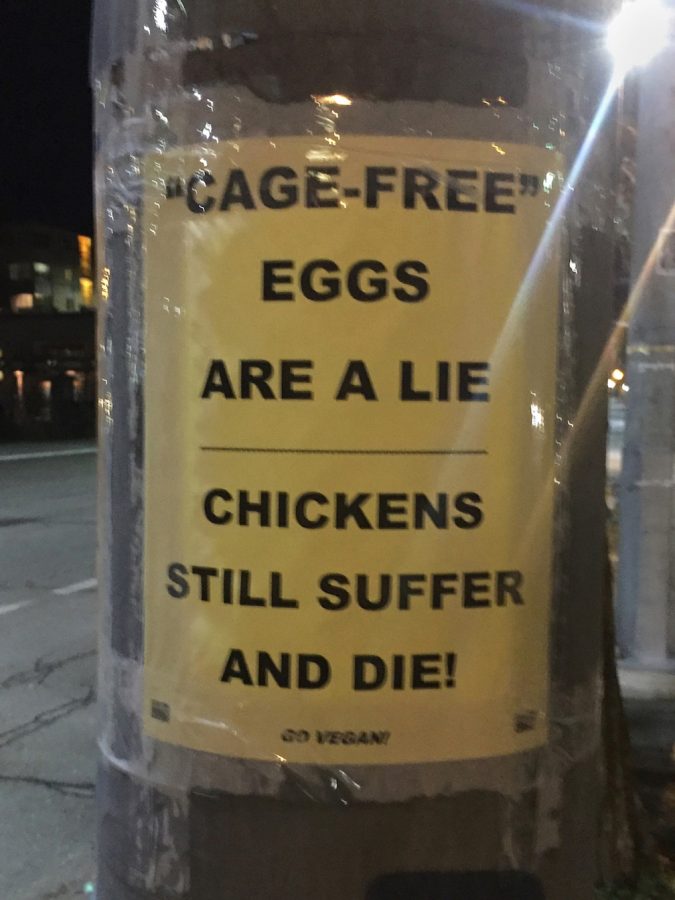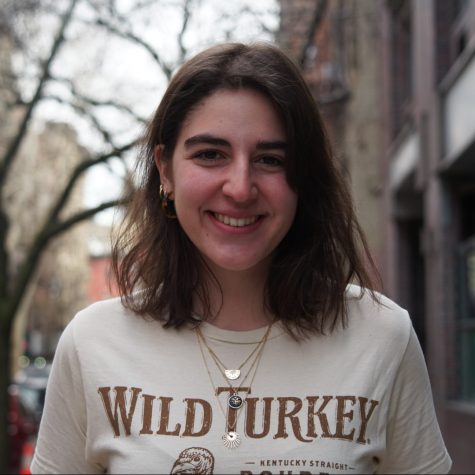How to Become a More Conscious Eater
The labels on food products can often be misleading because the vocabulary they use. “Cage free” labels for poultry products are meaningless because most birds are not typically caged.
February 22, 2017
The “what you see is what you get” food philosophy has lost significance since World War II, when people started caring about maximum profit and productivity to compete in the global market. With the rapidly growing population and the never-ending need for food, farmers and producers are trapped in a vicious cycle that relies on abusing animals, using unnatural and unethical substances participating in a completely unsustainable production system. What was once subsistence farming — producing just enough food to feed one’s family — has evolved into monoculture commercial farming. The lengths to which people go to increase their profit is abysmal. The unethical treatment of animals and the end product of the whole process leads us to question where our food comes from.
As the number of consumers concerned about animal welfare grows, more labels are put on packages. However, some NYU students, such as LS freshmen Juliana Fonseco-Alesso, feel that these labels can be misleading because of their vague nature.
“Labels on cosmetic products are easy to understand,” Fonseco-Alesso said. “It is very clear to tell whether a product was animal-tested or not; however, I have a hard time understanding the labels on food packages. I feel like companies are using these as distractions from the truth, and they are being very secretive about it.”
By recognizing these labels on food packages, you can become a more conscious eater, fight unethical commercial food producers and support local ethical farmers.
Animal Welfare Approved — Certified Label
This label can be found on dairy, eggs, chicken, beef, lamb, et cetera. It is one of the the only USDA-approved labels that supports and promotes family farmers who raise their animals outdoors according to the highest welfare standards. Beak trimming of poultry and tail docking of pigs and cattle are prohibited.
American Humane Certified — Certified Label
Found on dairy and meats, this American Humane Association certified label provides the lowest space allowances with 7.2 square feet and permits the use of cages for housing egg-laying hens. Beak trimming of poultry and tail docking of pigs without pain relief are allowed.
Certified Humane — Certified Label
This label can be found on dairy, eggs and meats. Minimum space allowances and indoor environmental enrichment must be provided. Beak trimming of hens and turkeys and tail docking of pigs are allowed under certain circumstances.
Food Alliance Certified — Certified Label
Food Alliance is a non-profit organization that supports sustainable agriculture, safe and fair working conditions and humane treatment of animals. Their standards include access to natural light, fresh air and space, but access to the outdoors is not required for all animals. Pain relief is not required for most physical alterations, including beak trimming and tail docking. Their standards do not address the treatment of animals at slaughter.
Free Range — Unverified Claim
According to the Animal Welfare Institute, the Free Range label does not have a legal definition, although USDA requires an application for this label. On-farm inspections are not conducted, therefore there is no way of knowing whether the animals are treated in a humane way. The guideline vaguely states that the animals must be given free access to the outdoors without any specification about the size of the outdoor space or the presence of vegetation.
Free range means that animals are granted access to the outside. Poultry may be kept indoors for bad weather. Sadly, chickens and other poultry raised for meat are slaughtered at just 42 days old, and often can’t step outside.
Humanely Raised/Humanely Handled and Sustainably Farmed — Unverified Claim
This label is basically a hoax because it is not verified by the government or a third-party organization. It only verifies that the producer has met its own standards; however these standards are very subjective and can be a marketing tactic to trick people into buying these products.
Cage Free — Misleading/Meaningless Claim
This claim makes no sense when used for poultry because unless they’re being transported to slaughter or they’re egg-laying, most birds aren’t caged. It is a way to trick consumers into believing they are purchasing ethical products.
Email Yasmin Gulec at dining@nyunews.com













































































































































